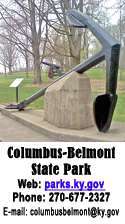|
Camp Nelson now U.S. historic landmark,
but national park status being sought
Camp Nelson kicked off 2014 by being designated as a National Historic Landmark, but that was just the beginning.
The Jessamine County camp and Civil War park now is seeking national park status.
Mary Kozak, special projects director for Jessamine County, noted that an estimated $200,000 would be the cost for a national park feasibility study. Camp Nelson attracts some 13,000 visitors per year.
U.S. Rep. Andy Barr, who spoke at the Jan. 4 historic landmark celebration, said he and his staff would meet with Jessamine leaders “to find out what more we can make of this place.” A feasibility study usually is initiated by a congressman.
Camp Nelson was established 150 years ago for the Union war effort as a supply depot, recruitment center and hospital facility. The camp was the nation's third-largest recruitment and training center for black troops with 10,000 trained there. Blacks who were enslaved gained freedom at Camp Nelson and a refugee camp was established to house the soldiers’ families and to provide schooling and medical care.
Designation as a National Historic Landmark is the highest status for a historic site recognized by the United States government that’s not a national park, according to Stephen McBride, Camp Nelson director of interpretation and archaeology.
The designation covers the 525 acres of the Civil War Heritage Park, the original part of Camp Nelson National Cemetery within the borders of a stonewall, and parts of the Hall community on the western side of U.S. 27. Camp Nelson already is on the National Register of Historic Places and is one of about 30 sites in Kentucky that are National Historic Landmarks, noted Bill Justice, superintendent of the Abraham Lincoln Birthplace National Historic Site in LaRue County. Justice represented the National Park Service at the celebration.
McBride said he submitted the application for the National Historic Landmark designation, citing the significant events of both the enlistment of black soldiers and the deaths of 102 soldiers’ spouses and children who perished after their expulsion by the government from Camp Nelson.
The deaths led to an act of Congress to emancipate the wives and children of black soldiers, McBride said. After the Civil War ended, the federal government sold most of the original site, leaving only a camp for black refugees and a small cemetery. It was expanded to become Camp Nelson National Cemetery in the 1860s.
|












